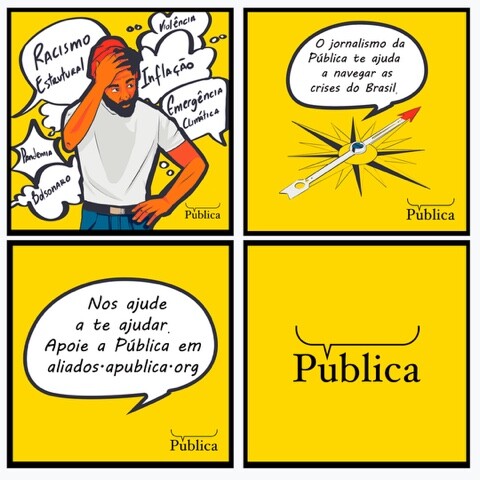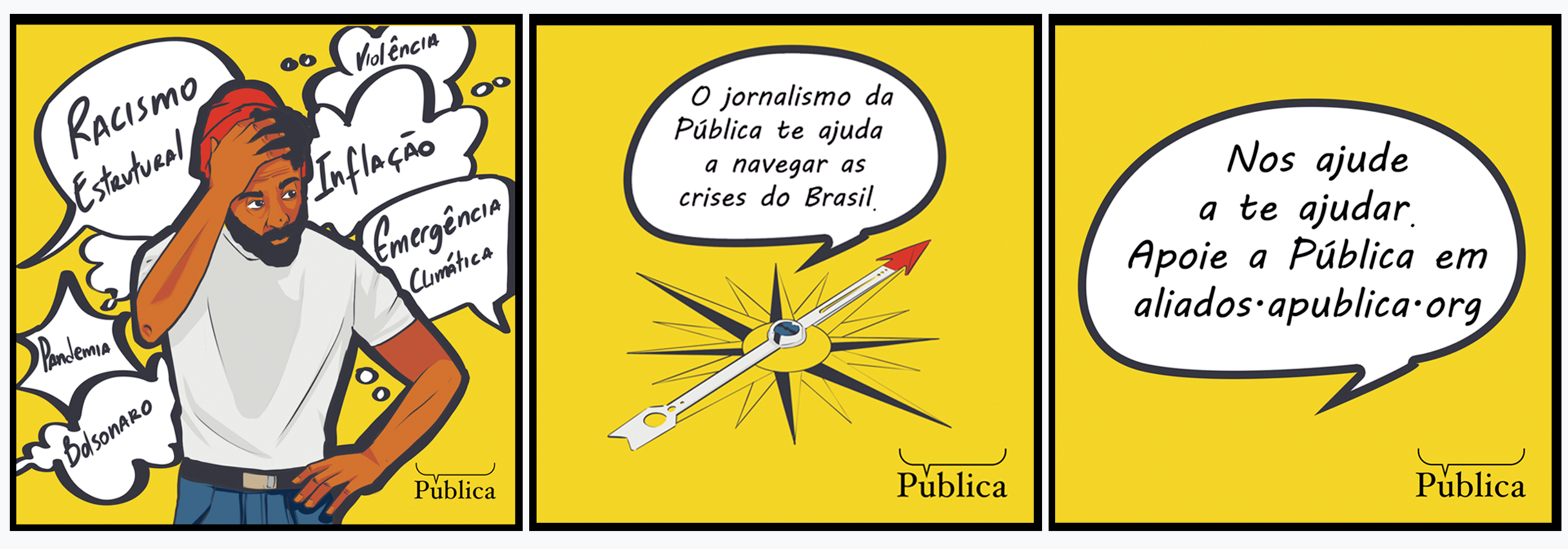In early 2023, the humanitarian crisis in Brazil’s largest Indigenous territory — of the Yanomami people, in the northern states of Amazonas and Roraima — became a nationally and internationally reported issue with the visit of President Luiz Inácio Lula da Silva to the area.
On January 20, the federal government declared a public health emergency due to lack of assistance to the Yanomami people and the large-scale invasion of their lands. They have suffered from the ongoing presence of upwards of 20,000 illegal miners according to estimates from Indigenous organizations, which has led to a large increase in deforestation and health problems linked to mining activity over the last four years.
Unpublished documents obtained by Agência Pública, using the Access to Information Law (LAI), show that the government was aware of the serious situation in the Yanomami territory, which had been reported for months by Indigenous leaders, but did not act to tackle the problem.
At a meeting of the National Council of the Legal Amazon held on August 30, 2022, its then leader — reserve general Hamilton Mourão, then also Brazil’s vice president — admitted that illegal miners continued to “invade Yanomami lands,” and so there was the “need to start a large-scale operation” in the territory, something that did not happen during the whole period of Jair Bolsonaro’s government.
This is recorded in the minutes of the organization’s meetings, which Agência Pública obtained using the LAI. Mourão was elected senator in 2022.
Reinstated on February 11, 2020 by Bolsonaro’s government and placed under the vice-presidency, the National Council of the Legal Amazon (CNAL) is the body responsible for “coordinating and integrating federal efforts for the conservation, protection, and development of the Brazilian Amazon and Amazonian cooperation.“
In practice, the council’s main action was the development of three law and order operations (known as GLOs) in the Amazon. These are operations where the presidency sends armed forces to reestablish order in a particular place, with the powers of the police. These have been criticized for militarizing the fight against environmental crimes and for their inability to stop the rise of deforestation, despite having spent BRL 550 million (about USD 108.4 million) of public funds.
Attacks on the press
Across the council’s ten ordinary meetings, from February 2020 to the end of Bolsonaro’s government in December 2022, the invasion of illegal miners in Yanomami territory was mentioned only once more, and there were not even any measures proposed to deal with it.
During its seventh meeting, on November 23, 2021, the Health Minister at the time, Marcelo Queiroga, criticized what he called the creation of “narratives” around the situation.
According to the records, he said his ministry was giving “special attention to the Yanomami, where there has been a chronic problem for over three decades,” and that “people who have nothing really to do with the interests of the Indigenous population exploit this fact to create the same narratives as always.” In the text, Mourão appears shortly after saying that the situation “has been exploited in a totally untruthful way by the media.”
A few days earlier, Fantástico, a popular Sunday TV program on the channel TV Globo, had shown a report with new images of the health crisis in the Yanomami Indigenous territory.
The minutes of the Council’s ten ordinary meetings show recurrent attacks on the press, which was common behaviour for then-president Bolsonaro and his allies during his four years in office.
Hamilton Mourão, as well as endorsing criticism of the alleged creation of “narratives” about the Yanomami in November 2021, was also unhappy with journalistic coverage of the murders of Indigenous expert Bruno Pereira and British reporter Dom Phillips in June 2022, in the Javari Valley in Amazonas state. Pereira worked for the Union of Indigenous Peoples of the Javari Valley (Univaja) helping the fight against environmental crimes affecting the territory, such as illegal fishing and hunting, after years as a public servant at Funai (Indigenous People National Foundation).
On August 30, 2022, during the ninth and penultimate meeting of the CNAL under Mourão’s leadership, he “said that the media, taking advantage of the regrettable deaths of Funai’s Indigenous expert and the journalist, exploited the fact that the ministries involved in fighting environmental crimes are facing difficulties in fulfilling their duties due to budgetary constraints from the federal government.”
This is the only mention of the situation in the Javari Valley Indigenous Territory, which has suffered numerous invasions, exhaustively reported by Univaja, and where there is the world’s highest concentration of isolated Indigenous peoples. Despite it being a border area, which involves national security, there is no reference in the records to any discussion of the Army’s role in the region.
Mining Policy
While the humanitarian crisis caused by illegal mining in Indigenous lands was little addressed in the CNAL’s meetings, in at least two meetings arguments were made in favour of liberalizing mining in these territories.
Hamilton Mourão spoke in favour of this more than once. On one occasion, in February 2021, the reserve general said the resistance to a bill that would authorize mining in Indigenous territories was “hypocrisy.” This legislation, known by its official number 191/2020, proposed to authorize the prospecting and mining of mineral and hydrocarbon resources in Indigenous territories – the Brazilian Constitution conditions this on approval from the National Congress and on holding consultation with affected communities.
He also said that he “hoped with the new leaders in Congress, with the new majority being built, we will be able to move forward on the issue of regularizing land; the issue of mining in Indigenous lands is something that has been held up in Congress for 33 years for a decision on and [it] has not made one.” A few days earlier, the Chamber of Deputies and the Senate had elected new presidents, with pro-Bolsonaro support.
The proposed legislation on mining in Indigenous lands (PL 191/2020) was not made law, nor was the other bill (PL 2.633/2020), which Mourão was referring to when he spoke of the need to move forward on the “issue of regularizing land.” A few days after the meeting in February 2021, a new proposal (PL 510/2021) with the same objective was presented. It is still pending in the Senate along with PL 2.633/2020, approved in the Chamber in August 2021.
In excerpts of the meeting records of the National Council of the Legal Amazon, the two projects were described as a priority for Bolsonaro’s government, especially land regulation which was mentioned various times.
Sixteen days from the end of Bolsonaro’s government and with Lula already elected, at its last meeting the council presented a plan for the Amazon, called Our Amazon Plan. It included measures, which that very government had failed to comply with and had attacked during its four years in power, such as “strengthening institutions for oversight and fighting environmental and territorial crimes” and “restoring governance of the Amazon Fund,” which was paralyzed at the very beginning of Bolsonaro’s government.
Agência Pública tried to contact Senator Hamilton Mourão so that he could provide clarification on the information revealed by the report, but didn’t receive a reply. After the report’s publication, he posted on social media to discredit the information as “untruthful” and called it the result of “partiality characteristic of low-quality journalism.”
Agência Pública reaffirms the information contained in this report and rejects any attempt to intimidate or attack the reputation of the news outlet and its reporters.











